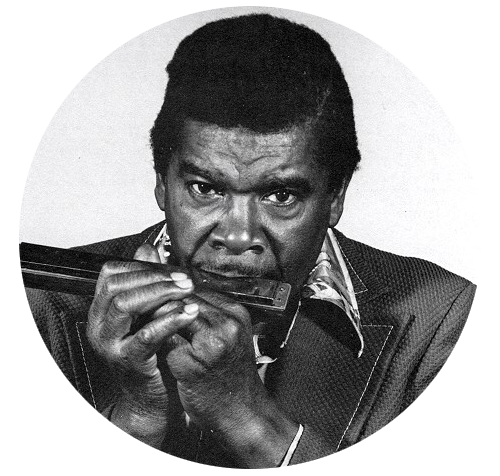
George “Harmonica” Smith is often rated by hardcore blues fans and musicians in the top tier of harmonicists ever to play the blues—not as widely known as others who have entered the Blues Hall of Fame before him, but in the same league. A master of the traditional 10-hole diatonic blues harp, Smith was also celebrated for his superior skills on the larger chromatic harmonica. Smith played with the Muddy Waters band at different times, recorded with some of the leading names in blues, and mentored a corps of young disciples in California including William Clarke, Rod Piazza, and Doug Macleod.
Smith learned harmonica from his mother, Jessie Smith, and began traveling to play with older musicians and on the street, learning pop standards and swing tunes as well as blues. His published biographies offer conflicting details due in part to the fact that none of them reveal his real name, which he gave as Allen George Washington when he applied for a Social Security card in 1939, citing his birthplace as Barton, Phillips County, Arkansas, and the date as April 5, 1921 – (In various bios he was born in Helena, Arkansas, or Cairo, Illinois, in 1924). The fact that he recorded under different names, including Little Walter Jr., Harmonica King, and George Allen, and said he also performed as Big Walter, further obscured his identity. He joined the Kansas City musicians’ union as George Washington in 1955 but when his first records came out that year, he was Little George Smith—yet he was not a little, man, either.
His family lived in the Missouri bootheel and southern Illinois after leaving Arkansas, but his rambles took him back to his parents’ home state of Mississippi, where he sang with a spiritual group in Jackson and played harmonica in Itta Bena and other towns. The first band he joined in Chicago was Otis Rush’s, and his first recording session was with Otis Spann in 1954. His first stint with Muddy Waters ended when he decided to go on his own in 1955. He found work in Kansas City, where he recorded for the RPM label and attracted enough attention for Universal Attractions to book him on an R&B package tour with other artists, including Champion Jack Dupree. Some of his finest recorded work came on a session with Dupree in 1955. He ended up in Los Angeles and recorded more singles under his various stage names and eventually created a following in a city not previously known for harmonica players. Though he did not lack in originality either in style or songwriting, he was called on to do a set of Little Walter tunes for his first album in 1968, backed primarily by the Muddy Waters band (which he had rejoined in 1966, only to resign so he could take care of his large family at home). Thereafter his albums, most recorded in L.A., Europe, or Japan, focused on his own music, and the renown of George “Harmonica” Smith continued to grow even without the benefit of hit recordings. He also played on sessions with Lowell Fulson, Sunnyland Slim, Little Johnny Taylor, Big Mama Thornton, Big Joe Turner, Eddie Taylor, Jimmy Witherspoon, and others. Despite heart trouble and financial struggles, he never gave up, and recorded his final album in Tempe, Arizona, just a few months before his death on October 2, 1983.
